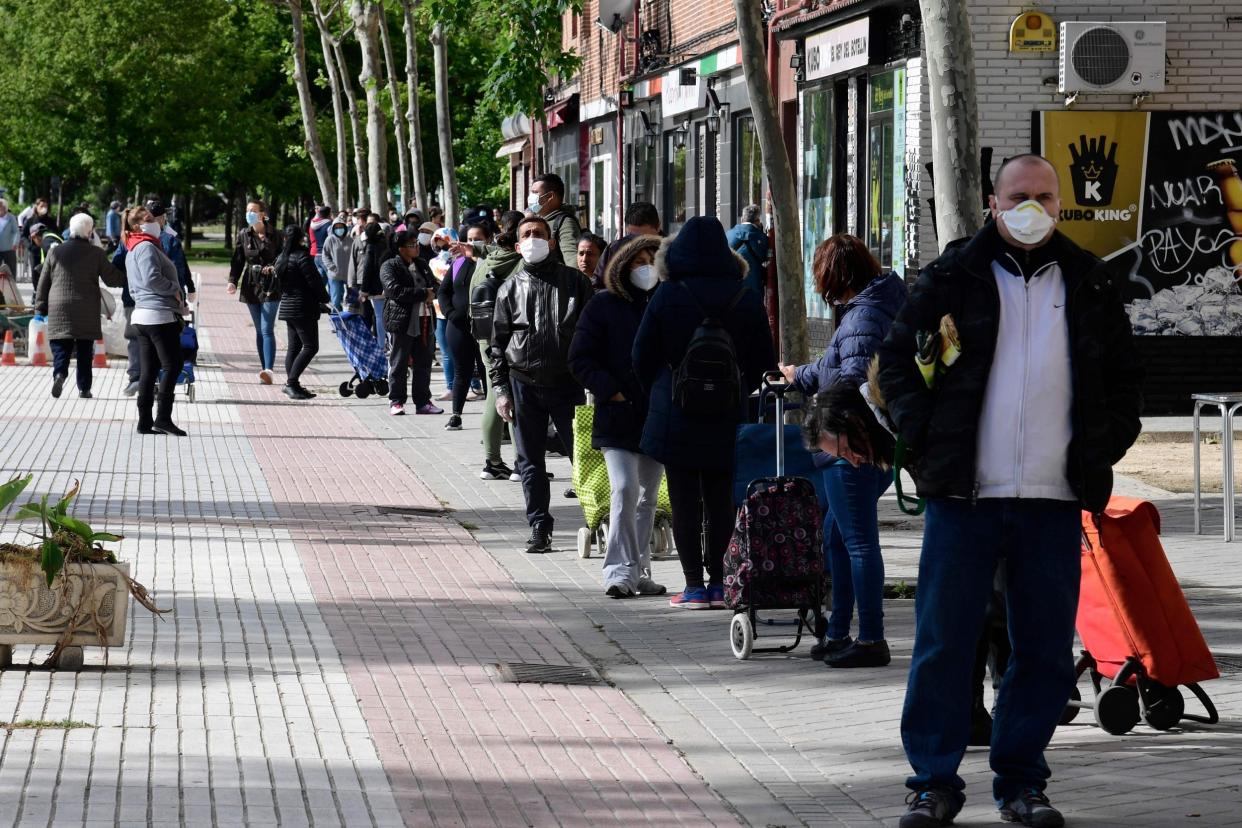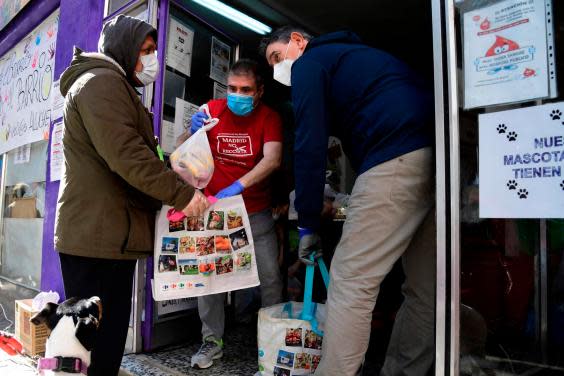‘Hunger queues’ and use of food banks on the rise as Spain struggles to recover from coronavirus

Erica Camargo is close to tears when she arrives to pick up her first basket of food from the Red Cross.
She lost her job in a hotel in Barcelona the night before and has not yet received any unemployment benefit.
With three children and a disabled husband to feed, she is unsure how she will manage.
“I am in shock. The worst thing is the uncertainty about the future. I don't know how I am going to feed my family,” she tells The Independent, as she picks up a box of fresh vegetables, frozen fish and rabbit from a pick-up point outside Barcelona.
Camargo joins the growing ranks of Spain's new poor, who led normal lives until the Covid-19 epidemic forced them into dependence on handouts.
She went for help at the food bank in Castelldefels, a commuter town home to Lionel Messi and other millionaire stars of FC Barcelona football club.
“Since the virus started, we have seen a total cross section of society come for help,” says Manolo Jerez, a Red Cross manager.
“I have lived here all my life and what has affected me most is to see friends and people I know come in here and ask for help. There is a mixture of necessity and shame on their part.”
A spokesperson for the Red Cross says since the country went into lockdown in March it has offered help to 1.6 million people across the country– five times higher than the same period in 2019.

As the colas de hambre, or hunger queues, lengthen across Spain, it is a familiar picture for other aid agencies.
Angel Franco, of the Spanish Federation of Food Banks (Fesbal) which works in parallel to the Red Cross and coordinates NGOs across the country, says the demand for basic necessities has risen by between 30 and 40 per cent since lockdown.
The organisation offered help to about 100,000 people per month last year, but since the Covid-19 crisis, this number has risen to about 130,000.
“To add to the number of people we are helping, the number of people who are asking for help has risen five times,” Franco added.

Spain has the largest share of population at risk of poverty in western Europe, 21.6 per cent according to the latest EU data, and the fifth largest in the eurozone, where the average is 16.9 per cent.
Unemployment before the Covid-19 crisis was 14.1 per cent - more than double the EU average - but this could rise to 19 per cent this year, according Spanish government forecasts.
In order to help the poorest in society, Spain's left-wing government will on Friday approve a programme to grant a basic income to help them to weather the economic downturn.
The money will provide financial aid to 2.5 million people and will cost the government between €3 to €3.5bn per year.
Frustration at the way the lockdown has paralysed the economy has erupted with nightly demonstrations held in well-off areas of Madrid, Barcelona and other Spanish cities.
Javier Daaz, an economist at IESE business school in Madrid, says the coronavirus crisis was a “perfect storm” for Spain.
“This is a country where people are packed in physically, there is a complicated devolved system of government which makes the crisis difficult to manage, the economy is dependent on tourism and there is a weak government,” he tells The Independent.
“All these factors make me think this year will be incredibly tough. We will not recover as quickly as we did after the 2008 financial crisis.”
Back at the food bank, Alberto El Mansouri, 25, one of the team of volunteers, is organising boxes filled with fresh meat, fish and vegetables.

Unfortunately, he also depends on food handouts.
Mansouri worked for a catering company which served taxi drivers waiting to pick up travellers at Barcelona airport.
When Spain closed its air, land and sea borders in March, the planes stopped flying and he was laid off.
“I receive between €800 and €700 per month for unemployment benefit. I have a two-year-old daughter and as I am separated from her mother I have to pay €200 for her upkeep plus other expenses, so I could not manage,” Mansouri says.
“I am desperate for the country to open up again so hopefully I can get my job back. But meanwhile I thought I would come here and help out.”
As the families arrived to pick up handouts, there was a glimmer of hope among the gloom.
Moses Fernandez, 47, was one of the volunteers who had been laid off from his job as a consultant with Seat, the Spanish car company, in March.
“I just got my job back!,” he beams. “I will be going back to work!”
There were no kisses or hugs, but lots of smiles.
Read more
When is World Hunger Day and what is this year’s theme?
What food banks really need you to donate right now
Global hunger could double due to coronavirus
Key workers demand living wage after carer ‘relied on food donations’
More than a million inflight meals used to feed vulnerable people

